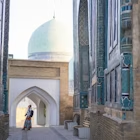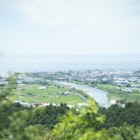
Returning to the best of Tokyo and Osaka
Sponsored by

Jul 30, 2021 тЂ 6 min read

The grounds of Osaka Castle is just one of many mostly outdoor experiences that are worth a look when Japan begins re-opening to tourism ТЉ f11photo / Shutterstock
Japan is often described as a juxtaposition; a complex blend of traditional and modern, melding into one of the most interesting places on Earth.
As the world begins re-opening to tourism, weтll take a fresh look at some familiar attractions in Tokyo and Osaka. From old favorites to innovative new landmarks, weтll explore how they have adapted in the age of COVID-19 and, importantly, how to visit them both responsibly and safely.
Here are some top (mostly outdoor) places to enjoy in Tokyo and Osaka amid тThe new normal.т

Tradition
Tokyoтs Edo-Tokyo Open Air Architectural Museum
The grounds of Osaka Castle Park
The Edo-Tokyo Open Air Architectural Museum in the western suburbs of Tokyo is a spacious outdoor museum that exhibits actual historic buildings that have been relocated and preserved for visitors.
The features a range of both Japanese- and Western-style architecture and is a wonder for those wanting to take interesting photos with beautiful, traditional backdrops. Be sure to visit the East Zone where buildings are assembled in a high-street formation with shops and an old sento bathhouse.
To manage numbers, the museum has introduced an online advanced ticketing system for a set date of entry.
Over in Osaka, head to the grounds of Osaka Castle for a magnificent view of one of the cityтs most famous landmarks. Osaka Castle Park is a favorite local spot to enjoy the changing seasons, including cherry and plum blossoms, and the fall colors.
Not-to-be-missed is 16-acre Nishinomaru Garden, covered half by lawn and 300 cherry blossom trees, allowing ample space to enjoy a socially-distanced picnic while taking in the commanding view of the castle tower and the stone walls of the moat.
Note that Osaka has a registration system for contact-tracing purposes.

Innovation
A Tokyo small-group E-Bike Tour
Osaka Harukas Observatory
From the traditional to the modern, couple your visit to the grounds of Osaka Castle with a trip up the cityтs 984-foot-high Osaka Harukas Observatory building, Japanтs tallest skyscraper. The observation deck, called тHarukas 300,т occupies the buildingтs top three floors (58-60).
Entrance to the observatory begins on the 16th floor, where a state-of-the-art elevator will whisk you up to the 60th floor in just 50 seconds.
On the 60th floor, enjoy panoramic views of Osaka with floor to ceiling windows, while the 58th floor is home to the Sky Garden 300 with its decked area and open-roofed atrium.
Back on ground-level in Tokyo, join an and explore the city with the wind in your hair and an experienced guide. Tours are purposefully kept small.
Bike tours are ideal for covering a lot of ground in a small amount of time. Both half-day and full-day tours are available and routes often include lesser-known streets and those too narrow for vehicles to access, giving participants a perspective that most visitors miss.
Rest assured that the frequent stops, excellent road conditions, and added boost of the e-bike, means a comfortable pace for everyone.

Food
Tokyoтs Outer Market
An Eat/Drink/Cycle tour of Osaka focused on outdoor eateries
Get to know the local food scene in Osaka with an of the city. These small food cycle tours focus on sampling tidbits in either outdoor eateries like those at or as take-out, allowing enjoyment of a rich sampling of some of the most famous dishes and popular local snacks Osaka has to offer, while limiting time indoors.
Youтll also be joined by an expert local guide who will not only help you navigate the streets, but Japanтs deep culinary culture. With participant numbers and time in each location limited, a cycling food tour is ideal for eating your way around the city.
Tsukiji Market, famed for its mind-boggling variety of seafood, is a Tokyo institution. While the wholesale тinner marketт has closed and relocated to Toyosu (and is now known as Toyosu Market), Tsukujiтs тouter marketт with its many shops and restaurants remains open and one of the best places to sample the freshest seafood in Tokyo.
The safest and most culturally appropriate way to enjoy the many culinary delights of the market is to only visit in small groups (streets and restaurants are small), not spend longer than is necessary when eating, and to eat take-out in front of the shop where you bought it.

Activity
Tokyoтs Shibuya Sky
Osakaтs Expoт70 Commemorative Park
With a full belly, head up another impressive building, this time in Tokyo. Shibuya Sky occupies the 14th, 45-46th floors and rooftop of the 750-foot-tall Shibuya Scramble Square, making it the highest building in Shibuya and the latest vantage point over the famous Shibuya Crossing.
Shibuya Sky is definitely not just another observation deck. Its huge rooftop space comes complete with тcloud hammocksт and 360-degree views, reached by a jaw-dropping escalator with a view.
The Sky Edge with its pointed glass corner that appears to almost merge into the horizon is breathtaking and a must for photos. In fact, the whole facility is incredibly Insta-bae (Insta-worthy) with a sleekness that doesnтt go unnoticed.
Stretch your legs in Osaka at the huge 260-hectare . The site was the venue for the World Expo held in 1970, an event that attracted a staggering 64 million people, and is now the perfect site for outdoor sightseeing.
One of a number of exhibits that have been preserved for visitors today is the 64-acre Japanese Garden, which showcases different Japanese garden styles from various time periods throughout history.
The Natural and Cultural Gardens were built over 244 acres on the site of the theme pavilions in a concerted effort to rehabilitate the area with nature. Donтt miss the тSoradoт aerial promenade т sora meaning тskyт and do meaning тroadт т a 980-foot walkway with a view over the forested surrounds.
Poking out from the treetops is the Tower of the Sun, a distinctive 230-foot-high and 67-foot-wide structure that was the symbol of the entire expo.
Nature
Tokyoтs Mt. Takao
Osakaтs Minoo Park
Mt. Takao is a well-known Tokyo respite and for good reason т not only is it less than an hour from the city center, but its small stature means a relatively short and easy hike in revitalizing natural surrounds.
There are various hiking trails to the nearly-2000-foot-summit, the most popular being trail No. 1, with its mostly broad and paved paths, and an expected climbing time of only 1.5 hours.
For the best cherry blossom viewing in spring, youтll want to make the 30-minute hike beyond the summit to the Itchodaira area, also known as Takaosan Senbonzakura or тMount Takao Thousand Cherry Treesт.
What Mt. Takao is to Tokyoites, is for Osakans. Less than 30 minutes from Osaka Station, visitors can take an easy three-kilometer (45-minute) hike along paved trails through beautiful mountain scenery.
Youтll pass a number of temples (Ryuanji Temple is worth a stop), and you may even come across some deer or monkeys. The main destination is Minoo Otaki waterfall, which is particularly renowned as an autumn colors viewing spot.
If you visit during fall, you must try the momiji tempura, maple leaves deep fried in batter sold at the park's refreshment stalls.
Sponsored by Tokyo Convention & Visitors Bureau and Osaka Convention & Tourism Bureau
As a travel entertainment and inspirational media outlet, we sometimes incorporate brand sponsors into our efforts. This activity is clearly labeled across our platforms.
This story was crafted collaboratively between Tokyo Convention & Visitors Bureau and Osaka Convention & Tourism Bureau and РЯАФУХСљКЯВЪПЊНБМЧТМ. Both parties provided research and curated content to produce this story. We disclose when information isnтt ours.
With sponsored content, both РЯАФУХСљКЯВЪПЊНБМЧТМ and our brand partners have specific responsibilities:
Brand partner
Determines the concept, provides briefing, research material, and may provide feedback.
РЯАФУХСљКЯВЪПЊНБМЧТМ
We provide expertise, firsthand insights, and verify with third-party sources when needed.
Explore related stories


 Festivals & EventsThe 12 best places to witness the winter solstice in 2024
Festivals & EventsThe 12 best places to witness the winter solstice in 2024Dec 9, 2024 тЂ 8 min read



 Festivals & EventsChristmas dinners around the world: choose your favorite festive dishes
Festivals & EventsChristmas dinners around the world: choose your favorite festive dishesNov 22, 2024 тЂ 5 min read


 Food and Drink6 of the best places for sushi in Kanazawa, Japanтs sushi capital
Food and Drink6 of the best places for sushi in Kanazawa, Japanтs sushi capitalOct 28, 2024 тЂ 5 min read
